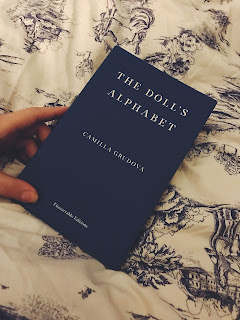‘The Dolls Alphabet’ is a striking debut collection of short stories by Camilla Grudova that will haunt you. This book was lent to me by a lovely colleague, friend and amazing graphic designer, Anna and I shall read anything else she puts in front of me after this after this amazing recommendation.
There is a consistency to Camilla’s stories that makes me feel like they could all fit within this strange universe. Left in a fantastical nightmare landscape lending itself between a dystopian future and post war desperation. Although sincerely strange, themes run throughout all the stories and recurring imagery ties them together.
Grudova’s writing commands all the senses and takes over as you take the pace of whichever story you find yourself reading. ‘Unstitching’ sees women learning to unstitch their own skin, hair and clothes. Peeling themselves to embrace their true forms in comfortable surrealism. This theme of sewing and women finds its way into nearly every story alongside birth and motherhood, identity and domesticity, possessions, mythology and gender.
The sewing machine transforms in different stories, controlling women in some, freeing them in others and hypnotising men or driving them to deformity in what remains. In ‘Waxy’ we find the protagonist working in a factory painting sewing machines in order to fund a society where women must be partnered with a man. Whereas the men earn their money taking philosophy exams. The story forms this hazy, almost unnatural landscape where they survive on tinned foods, golden syrup and toast. The narrators male partner doesn’t fit into this system they should conform too, and they along with their deformed new born must do what they can to survive.
As these themes bend into each other it becomes harder and harder to tell what or why the societies are structured by, with the sometimes naive tone of the narrators suggesting they are as in the dark about these social rules as us the reader.
‘The Dolls Alphabet’ is it’s own cabinet of curiosities drawing on myth of mermaids and werewolves, fancy dress, the deformity of domestic life and in ‘The Moth Emporium’ the combination of these curiosities paves the way for sexual violence. With the narrators husband allowing an artist to install sculptures in their costume shop home depicting rape and murder. In every story it feels like women’s bodies are under threat, with every woman struggling with the corruption, the illogical and the mundane in extraordinary and surreal ways. Grudova is extremely talented in the way all of this is feels so naturally vivid whilst completely discomforting.
Another oddity within ‘The Dolls Alphabet’ collection is that despite this strange futuristic feel about the stories everything seems old, outdated or abandoned like the landscape is recovering from something. As readers it feels like we were never meant to understand these landscapes but focus on the exquisite details that went into mundane objects and the way it reflected imbalances of power and privilege. Tinned meat and cans are a recurring object, showing for some life is always on the breadline but for others their possessions are sealed in tins for protection in ‘Hungarian Sprouts’ . A vast difference from living to the most basic human needs to the otherworldly materialistic.
‘Notes From A Spider’ continues this materialism alongside privilege but with a introduction that references a brighter future for the people that inhabit ‘The Dolls Alphabet’. Half man, half spider becomes a muse for many with his unusual form and is placed on a pedestal as an advertisement for luxury products. But within all this attention he seeks an unreachable fulfilment. After countless women he falls in love with the inhuman thigh of a sewing machine leg, Florence. Again the motif is reinvented into this male obsession with seamstresses ordered to sew with Florence until their death. Loosing lives until he cuts his own leg and orders another seamstress to sew it closed, starting a new addiction of absurd love and agony.
Grudova has this beautiful way with language, colliding beauty with the grotesque. Alluring us, the reader with stunning prose that builds into this sinister and seductive story until you are trapped within this visual discomfort formed from her imagination. ‘Agatas Machine’ conjures up a pierrot and an angel in a dank attic space and takes us and the young protagonist away like puppets are directing the stories. There is a consistency to all this surrealness and a vividness that makes it feel like these stories are not too far in our future.
Grudova’s debut collection is one of the best things I have read this year and I cannot wait to see what else she has to come. I still cannot say what these stories are about but they have haunted me and this is proof enough.
Get yours here: The Doll's Alphabet



No comments
Post a Comment